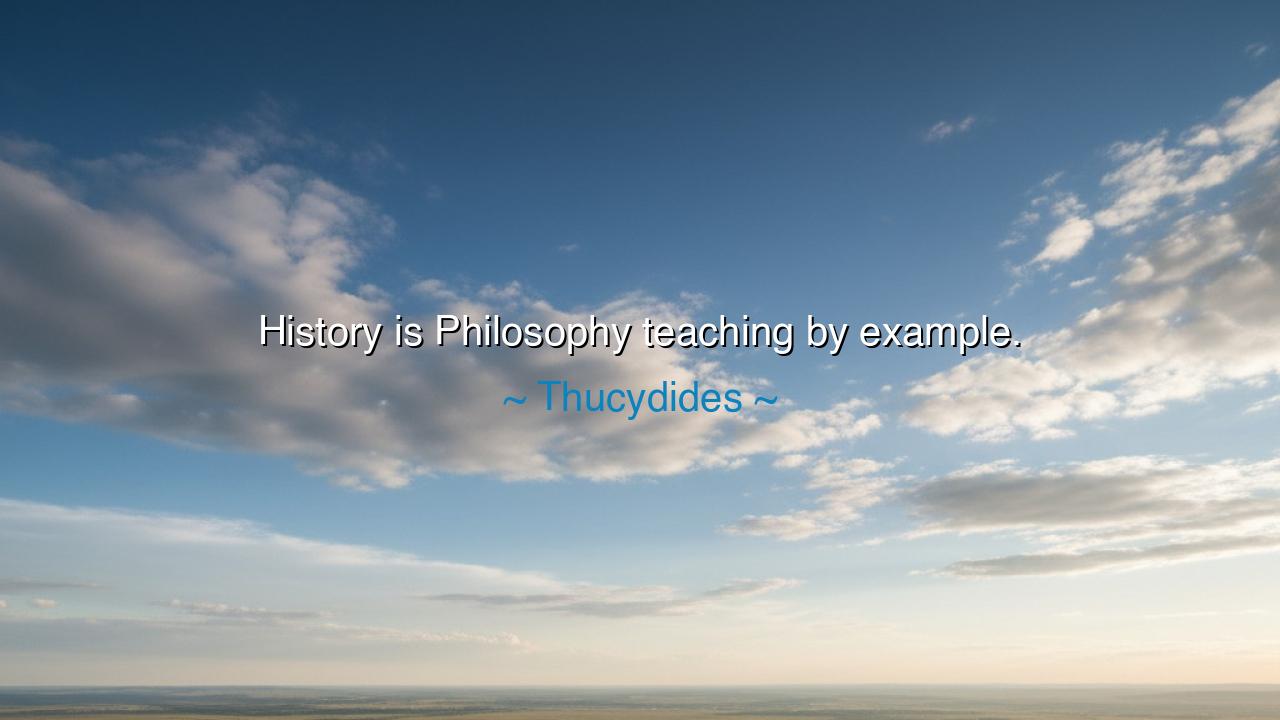
History is Philosophy teaching by example.






The ancient historian Thucydides, who chronicled the wars and tempests of men with the clarity of a prophet, once declared: “History is Philosophy teaching by example.” In this profound statement, he revealed the sacred purpose of history — not as a mere record of events, but as the living teacher of wisdom. To Thucydides, history was not a scroll of names and dates; it was the unfolding of the human soul through time, the mirror by which nations and individuals might behold themselves. Philosophy gives us the principles of right and wrong, of truth and deceit, of virtue and decay — but history shows us these principles embodied in flesh, tested by fate, and judged by consequence.
The origin of this quote can be traced to the spirit in which Thucydides wrote his immortal History of the Peloponnesian War. He lived in a time of great upheaval, when the proud city of Athens, once radiant in its democracy and culture, devoured itself through ambition and fear. In watching this tragedy unfold, Thucydides saw that every act of state and every error of man was not new — it was a repetition of timeless patterns: greed disguised as glory, cowardice masked as caution, hubris mistaken for wisdom. From this realization came his belief that the study of history is the truest form of philosophy, for it reveals how ideas live and die in the world of men.
To call history “philosophy teaching by example” is to say that wisdom cannot dwell in theory alone. Philosophy speaks in principles; history shows their price. One may read in philosophy that injustice breeds ruin — but history shows the fall of empires built upon cruelty. One may learn that pride precedes destruction — but history demonstrates it in the ashes of Rome, in the fall of Napoleon, in the silent ruins of every civilization that exalted itself above truth. Thus, history becomes the visible soul of philosophy — the field where moral law reveals itself through human action.
Consider the story of Pericles, the great Athenian leader whose vision of democracy inspired an age. He led his city to greatness through art, reason, and liberty — yet his ambition, and the arrogance of his people, drew Athens into a war it could not win. Under his command, Athens expanded its empire, but in doing so, it betrayed the very ideals that had made it great. The Peloponnesian War, chronicled by Thucydides himself, became the grave of Athenian freedom. What lesson does history teach through this example? That power without humility leads to ruin, that no ideal can endure if it becomes a tool of domination. Philosophy may say this in words — but history engraves it in memory, forever.
Indeed, Thucydides himself wrote not for his own time alone, but “for all time.” He saw that human nature — with its mixture of courage and weakness, generosity and greed — remains constant, and therefore the examples of the past will always speak to the future. History is the laboratory of philosophy, where the thoughts of the wise are tested by the deeds of men. Every generation inherits these examples, yet only the thoughtful draw meaning from them. The fool repeats the past; the wise learn from it.
This truth resounds through every age. When the Founding Fathers of America studied history, they read not only events, but warnings — the fall of Athenian democracy, the corruption of the Roman Republic, the tyranny of kings who mistook themselves for gods. It was from these examples that they forged a system built upon balance, humility, and restraint. They understood, as Thucydides did, that philosophy without history is blind, and history without philosophy is meaningless. Thus, they sought to combine both — to build a nation not upon theory alone, but upon the lessons of time.
And so, my children of the present age, remember the eternal wisdom of Thucydides: that history is not dead, but alive — the great teacher of humanity. Read not the past as a scholar reads a book, but as a pilgrim reads a sacred text, searching for the truth that speaks to his own soul. When you see the rise of pride, recall the fall of empires. When you witness injustice, remember the ruin of those who built their thrones upon it. When you are tempted to despair, remember the endurance of those who rebuilt from ashes.
For in the end, history is the voice of experience, and its examples are the footprints of all who came before us. Walk with them, learn from them, and you will live not as one born yesterday, but as an heir to the wisdom of the ages. Let history be your philosopher, your guide, your mirror. And as Thucydides taught, let its examples awaken in you not mere knowledge, but understanding — for it is by that understanding that both men and nations are made wise.






AAdministratorAdministrator
Welcome, honored guests. Please leave a comment, we will respond soon